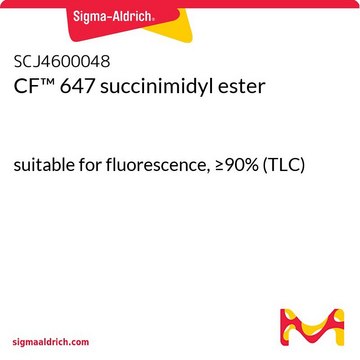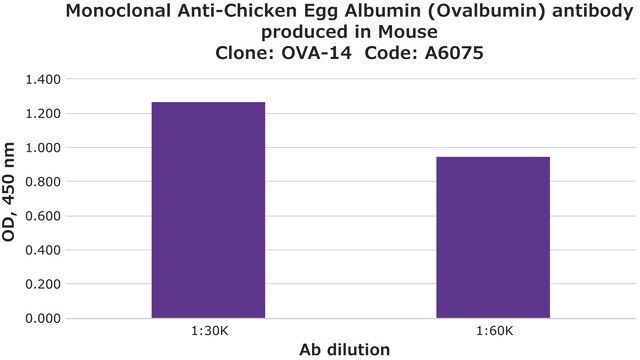Wszystkie zdjęcia(1)
Key Documents
SBVT15
SB-MRP3-HEK293
Synonim(y):
ABC31, MLP2, MRP3, MRP3 human membrane vesicles, Multidrug resistance protein 3
Zaloguj sięWyświetlanie cen organizacyjnych i kontraktowych
About This Item
Kod UNSPSC:
12352202
Polecane produkty
Postać
liquid
stężenie
5 mg/mL
Warunki transportu
dry ice
temp. przechowywania
−70°C
informacje o genach
human ... ABCC3(8714)
Opis ogólny
Membrane Preparations for Vesicular Transport Assays (VT) are suitable for general drug-efflux transporter interaction studies. Both substrate and inhibitor interactions can be assessed using vesicles. The success of substrate interaction studies strongly depends on the passive permeability of the compound. High permeability substrates might not be detected. Control Membranes with no-, or significantly lower transporter activity are also available.
Zastosowanie
In the vesicular transport assay so-called "inside-out" membrane vesicles containing ABC transporters are applied. Incubating substrates of the respective efflux transporter in the presence of the inverted membrane vesicles and ATP will allow measuring accumulation of the substrates into the vesicles. In many cases radiolabeled reporter substrates are used but recently SOLVO developed the new PREDIVEZ Vesicular Transport Kits that use fluorescent reporter substrates.
The standard vesicular transport assay is an inhibitory assay performed with cold test articles. This assay provides information on any interaction between the ABC transporter and the test article. The transport of the reporter substrate is measured in the presence of the test article (typically in 7 concentrations) and IC50 is defined as the concentration inhibiting the transport of the reporter substrate by 50%.
Should radiolabeled form of the investigated compound or adequate analytical methods (LC/MS, HPLC) be available, the vesicular transport assay may be performed in a direct format without the reporter substrate and may identify substrate nature of the test article. The vesicular transport substrate assay is a low throughput assay. It is suitable for low permeability test compounds as high permeability compounds may escape from the vesicles through the lipid bilayer.
PREDIVEZ vesicular transport kit is sold separately. This transporter membrane vesicle assay requires the PREDIVEZ vesicular transport kit and corresponding control membrane below:
SB PREDIVEZ Reagent Kit for MRP2, MRP3, and MRP5 part number SBPVR3-9RXN and corresponding control membrane SB-HEK293-Mock-CTRL part number SBCT06-1EA
The standard vesicular transport assay is an inhibitory assay performed with cold test articles. This assay provides information on any interaction between the ABC transporter and the test article. The transport of the reporter substrate is measured in the presence of the test article (typically in 7 concentrations) and IC50 is defined as the concentration inhibiting the transport of the reporter substrate by 50%.
Should radiolabeled form of the investigated compound or adequate analytical methods (LC/MS, HPLC) be available, the vesicular transport assay may be performed in a direct format without the reporter substrate and may identify substrate nature of the test article. The vesicular transport substrate assay is a low throughput assay. It is suitable for low permeability test compounds as high permeability compounds may escape from the vesicles through the lipid bilayer.
PREDIVEZ vesicular transport kit is sold separately. This transporter membrane vesicle assay requires the PREDIVEZ vesicular transport kit and corresponding control membrane below:
SB PREDIVEZ Reagent Kit for MRP2, MRP3, and MRP5 part number SBPVR3-9RXN and corresponding control membrane SB-HEK293-Mock-CTRL part number SBCT06-1EA
Opakowanie
500 μL
Postać fizyczna
Supplied as frozen membrane vesicles, containing 5 mg/ml membrane protein, labeled with volume, catalog number (transporter) and date of production.
Informacje prawne
Distributed for SOLVO Biotechnology, Inc.
This page may contain text that has been machine translated.
Kod klasy składowania
10 - Combustible liquids
Klasa zagrożenia wodnego (WGK)
WGK 2
Temperatura zapłonu (°F)
Not applicable
Temperatura zapłonu (°C)
Not applicable
Certyfikaty analizy (CoA)
Poszukaj Certyfikaty analizy (CoA), wpisując numer partii/serii produktów. Numery serii i partii można znaleźć na etykiecie produktu po słowach „seria” lub „partia”.
Masz już ten produkt?
Dokumenty związane z niedawno zakupionymi produktami zostały zamieszczone w Bibliotece dokumentów.
Expression of the multidrug resistance proteins MRP2 and MRP3 in human cholangiocellular carcinomas.
S Rau et al.
European journal of clinical investigation, 38(2), 134-142 (2008-01-30)
Cholangiocellular carcinomas and gallbladder carcinomas are highly aggressive tumours with a poor prognosis and are generally regarded as chemoresistant tumours. Overexpression of ATP-binding cassette transporters of the multidrug resistance protein (MDR) and multidrug resistance-related protein (MRP) family in cancer cells
T Hirohashi et al.
The Journal of pharmacology and experimental therapeutics, 292(1), 265-270 (1999-12-22)
Several organic anions are actively extruded from intestinal epithelial cells into the lumen and vascular sides. To examine the role of the multidrug resistance-associated protein (MRP) family in the intestinal efflux of organic anions, the function and expression of these
Koen van de Wetering et al.
Gastroenterology, 137(5), 1725-1735 (2009-07-07)
The physiologic function of the efflux transporter Multidrug Resistance Protein 3 (MRP3) remains poorly defined. In vitro, MRP3 transports several glucuronidated compounds, but the compounds transported under physiologic conditions are unknown. Knowledge of the compounds transported by MRP3 in vivo
George L Scheffer et al.
Laboratory investigation; a journal of technical methods and pathology, 82(2), 193-201 (2002-02-19)
The multidrug resistance protein (MRP) family consists of several members and, for some of these transporter proteins, distinct roles in multidrug resistance and normal tissue functions have been well established (MRP1 and MRP2) or are still under investigation (MRP3). MRP3
Laura Partanen et al.
Genes, chromosomes & cancer, 51(9), 832-840 (2012-05-16)
The ATP-binding cassette (ABC) of active transporters comprises a group of proteins that which facilitate efflux of anticancer drugs from cancer cells. We focused on the gene amplification and protein expression of ABCC3 (also known as MRP3) in breast cancer
Nasz zespół naukowców ma doświadczenie we wszystkich obszarach badań, w tym w naukach przyrodniczych, materiałoznawstwie, syntezie chemicznej, chromatografii, analityce i wielu innych dziedzinach.
Skontaktuj się z zespołem ds. pomocy technicznej








